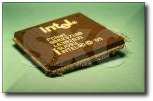
A 3-D visualisation of virtual desktops
switching under 3-D Desktop (click image above for homepage)
 IRTUAL desktops are means of extending one’s workspace. Given the finite size of a monitor, one wonders if that size also imposes strict limits on the (in)visible window environment. Well, it does not. It is possible to treat the monitor as just a rectagular box or a a ‘sliding window’, which metaphrically glances at something much larger. It enables the user to view smaller segments of the whole at any one time. Most commonly, the user would watch only a quarter of the workspace at any one time.
IRTUAL desktops are means of extending one’s workspace. Given the finite size of a monitor, one wonders if that size also imposes strict limits on the (in)visible window environment. Well, it does not. It is possible to treat the monitor as just a rectagular box or a a ‘sliding window’, which metaphrically glances at something much larger. It enables the user to view smaller segments of the whole at any one time. Most commonly, the user would watch only a quarter of the workspace at any one time.
Virtual desktop environments have been available for a long time to Linux user. They will also be officially introduced in Windows Vista, having encountered third-party software that achieved this in the past. Apple Macs have commercial add-ons that achieve the same thing — presenting the users with a pager to control multiple virtual desktops.
The Pager is a small widget which enables the user to select which segment of the screen should be viewed. More specifically, it enables switching from one virtual desktop to another. It often reflects on the content in all virtual desktops. In KDE, for example, the pager contains a schematic of active windows and their positions. In GNOME, it appears to even embed application icons. I used the Pager with virtual desktops about 4 years ago, but not excessively. I needed them when doing some programming jobs, but wasn’t competent with the corresponding CTRL+[1-4] shortcuts, which make the transition between one desktop to another very smooth and rapid.
On to page 2







 Filed under:
Filed under: 
 IRTUAL desktops are means of extending one’s workspace. Given the finite size of a monitor, one wonders if that size also imposes strict limits on the (in)visible window environment. Well, it does not. It is possible to treat the monitor as just a rectagular box or a a ‘sliding window’, which metaphrically glances at something much larger. It enables the user to view smaller segments of the whole at any one time. Most commonly, the user would watch only a quarter of the workspace at any one time.
IRTUAL desktops are means of extending one’s workspace. Given the finite size of a monitor, one wonders if that size also imposes strict limits on the (in)visible window environment. Well, it does not. It is possible to treat the monitor as just a rectagular box or a a ‘sliding window’, which metaphrically glances at something much larger. It enables the user to view smaller segments of the whole at any one time. Most commonly, the user would watch only a quarter of the workspace at any one time.
 OR the past few weeks I have been working with the existing revision of WordPress 2.0 (RC2, soon Beta). It is currently on ‘feature freeze’, so it’s primarily a matter of cleaning up all imperfections and minor bugs. The nightly build of WordPress appears to be in a solid state and can definitely be described as “impressive”. My intention is to move this modified WordPress 1.2 blog (as well as another) into a newer and more robust section. There are various limitations to WordPress 1.2, the main one being its adaptability to scale and accommodation for functionality.
OR the past few weeks I have been working with the existing revision of WordPress 2.0 (RC2, soon Beta). It is currently on ‘feature freeze’, so it’s primarily a matter of cleaning up all imperfections and minor bugs. The nightly build of WordPress appears to be in a solid state and can definitely be described as “impressive”. My intention is to move this modified WordPress 1.2 blog (as well as another) into a newer and more robust section. There are various limitations to WordPress 1.2, the main one being its adaptability to scale and accommodation for functionality.
 HERE is a certain rumour, according to which
HERE is a certain rumour, according to which  My personal experiences in handling comment spam are limited, as often is the case. Very few individuals have had the opportunity to test the full spectrum of any given type of software or product (a classic example are laptops, of which they are many models and manufacturers). Only an exhaustive trial, in turn, enables to give a good and comprehensive review.
My personal experiences in handling comment spam are limited, as often is the case. Very few individuals have had the opportunity to test the full spectrum of any given type of software or product (a classic example are laptops, of which they are many models and manufacturers). Only an exhaustive trial, in turn, enables to give a good and comprehensive review.
 HILE many of us are afraid of change, some of us refuse to accept change. At some of the worst scenarios, without any awareness, we can miss out on tremendous benefits. Examples from the hardware domain:
HILE many of us are afraid of change, some of us refuse to accept change. At some of the worst scenarios, without any awareness, we can miss out on tremendous benefits. Examples from the hardware domain: ntel are starting to feel the greatest of heats from their competition, most notably AMD. That heat cannot be circumvented by more fans or underclocking either. As
ntel are starting to feel the greatest of heats from their competition, most notably AMD. That heat cannot be circumvented by more fans or underclocking either. As  As if that was not enough,
As if that was not enough,